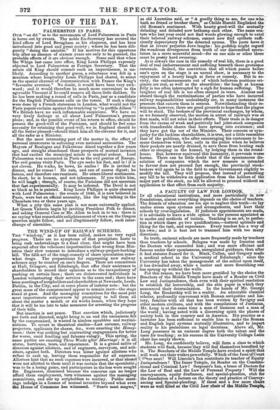THE WIND-17P OF RAILWAY SCHEMES.
THE " wind-up," as it has been called, makes no very rapid progress. There are no symptoms of that precipitate haste to bring rash undertakings to a final close, that might have been expected after the vehement importunities that wrung from Min- isters their slow consent to introduce a railway-project-burking bill. The fifth act of the tragi-comedy of share speculation some- what drags. The preparations for suppressing new railway schemes may be counted on one's fingers. There are committees at Hull, Glasgow, and Edinburgh, that offer their assistance to shareholders to record their opinions as to the inexpediency of pushing on certain lines ; there are disinterested individuals in London volunteering their services to the same end ; there have been meetings of scripholders and shareholders at Newcastle, Leeds. Dublin, in the City, and at some places of inferior note : but the great mass of the compromised appear to remain inert—the stags stand at gaze. And the managing committees for the most part meet importunate scripowners by promising to tell them all about the matter a month or six weeks hence, when they hope that it will be too late to take measures for arresting the progress of their bills.
But inaction is not peace. That exertion which, judiciously put forth and directed, might bring to an end the uneasiness felt by the compromised, is wasted in aimless squabbles and recrimi- nations. To revert to theatrical similes—Last autumn, railway projectors, applicants for shares, &c., were enacting the Honey- moon : there was nothing but contracting engagements for better for worse, amid fondling and fulsome eulogy. This spring, the same parties are enacting Three Weeks after Marriage : it is all storm, hurricane, tears, and repentance. It is a grand melee of directors against allottees, and of engineers, surveyors, and soli- citors, against both. Directors wax bitter against allottees who refuse to cash up, leaving them responsible for all expenses. Allottees hint that no such expenses were incurred, or that shad were not allotted to them until it was certain that the speculatio,k was to be a losing game, and participators in the loss were sought for. Engineers, dismissed because the concerns can no longer afford them employment, turn witnesses against the managing committees, and stir up scripholders to mutiny. Public meet- ings indulge in a licence of mutual invective beyond what even the House of Commons has witnessed. " Suave mari magno,"
as old Lucretius said, H
or " A goodly thing to see, for one who hath no friend or brother there," as Childe arold Englished the old Roman's sentiment. With hearty good-will the mutually deluding and deluded now bethump each other. The same ora- tors who last year could not find words glowing enough to extol their beloved railway schemes, cannot now find epithets suffi- ciently depreciatory for the detected syrens. The poets have it that at lovers' perjuries Jove laughs : his godship might regard the wondrous divergences from truth of our discomfited specu- lators in a more mournful mood—for on one side or other there must be pretty hard swearing. As is always the case in the comedy of real life, there is a good deal of real embarrassment and suffering beneath these grotesque externals. Indeed, the conviction that all which passes before one's eyes on the stage is an unreal show, is necessary to the enjoyment of a hearty laugh at farce or comedy. But in so- ciety, the embarrassments out of which ludicrous positions ori- ginate are real, as well as the absurdities : the laugh at human folly is too often interrupted by a sigh for human suffering. The laughter of real life is too often steeped in tears. Aimless and absurd though the recriminations of parties who have incurred railway responsibilities undoubtedly are, in many instances the pressure that extorts them is serious. Notwithstanding their re- missness, however, there are good grounds to hope that the plague will be staid. The brokers of the provincial exchanges, by whom, as we formerly observed, the motion in arrest of railways was at first made, will not relax in their efforts. Their trade is in danger from the excess of weak and positively bad joint-stock companies with transferable shares that have sprung into existence ; and they have got the ear of the Minister. Their concern or sym- pathy for the luckless shareholders, it is true, not a little resembles that of the publican, who after encouraging his customers to be- muse themselves with beer, calls in the police when he believes their pockets are nearly drained, to save them from beating each other or sleeping in the kennel, by lodging them in the round- house. But, however equivocal this humanity, it prevents worse harms. There can be little doubt that if the spontaneous dis- solution of companies which the new measure is intended to favour does not proceed fast enough, the provincial stock- brokers will again be in the field to urge Government slightly to modify the bill. They will propose, that instead of permitting any bill to be withdrawn on application from the holders of the major part of the stock, no bill be allowed to proceed without an application to that effect from such majority.


























 Previous page
Previous page